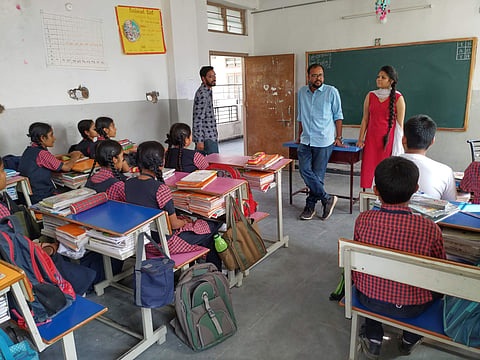

Infrastructure (computers, internet and so on) and language (most material is available in English alone) are the two main predicaments that are keeping children from learning to code. The non-profit Coding For All is tackling both these problems effectively. Firstly, they teach coding in Telugu and secondly, with the help of their app, children can write the code on paper, scan it and then the app runs it instantly. Impressed with their ways, even the Government of Telangana partnered with them last year to work with 50 schools. Thus, this initiative that was started in 2018 by M Omkarnath (29), CEO and Abhimanyu Sarkar (32), COO, has impacted 30,000 children in 123 schools already and now, are on their way to impacting 50,000 more.
To understand Coding For all, we think it's crucial to understand where Omkarnath and Abhimanyu come from. Omkar, through his previous initiative, Silikon Innovations, was already teaching in schools, but he felt the urgent need to focus on lower-income children. Similarly, Abhimanyu, who moved to the social sector after his stint at KPMG, used to teach at government schools but knew that when it comes to digital literacy, there is a lot of work to be done. Thus, when the duo met via a mutual friend, they discussed ideas and started Coding For All, a non-profit that imparts digital literacy. "All it requires are two to three classes once a week and a teacher to help them through it," says Abhimanyu. It was through a pilot that they ran in February and March 2019 that they understood the two aforementioned problems in detail. It was after this that they started developing the idea of Coding For All.
Hyderabad-based Omkar takes us through the curriculum which involves, for now, students of class VIII learning basic programming languages. This involves breaking down tasks into simple concepts. After these languages are taught, children proceed to practise them on paper. "While we are developing workbooks so that students can understand better, the final step is the verification of the code, which happens via the app installed in the teacher's tab. Depending on whether the code runs or not, the students understand immediately," explains Abhimanyu who is based out of Delhi. But children will have to learn how to code on the computer at some point. And for this, they are looking for NGOs who already have the infrastructure they can utilise to teach children.
"We also plan to support our students till they complete college and connect them to other organisations that can provide them ancillary skills to help them be job-ready," informs Omkar. "We are also, in parallel, creating content in other regional languages and we intend to partner with other state governments and reach out to all government schools in the country in the next ten years," shares the duo.
For more on them check out codingforall.in
